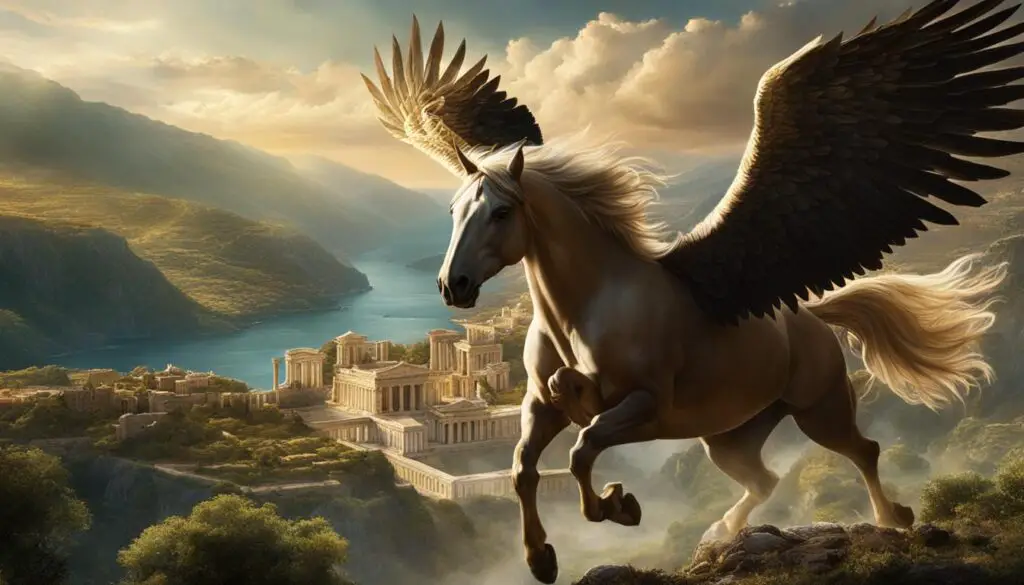Welcome to our exploration of the enchanting world of Greek mythology! In this article, we delve into the captivating tale of Pegasus, the majestic winged horse. Join us as we uncover the powers, symbolism, and profound influence of this mythical creature.
Key Takeaways
- Pegasus, born from the severed neck of Medusa, played a crucial role in Greek mythology.
- Symbolizing power and freedom, Pegasus’ ability to fly was legendary.
- The partnership between Pegasus and Bellerophon showcased heroism and courage.
- Pegasus’ influence extends beyond mythology, appearing in art, literature, and popular culture.
- The Pegasus Effect highlights how mythology can inspire corporate success through innovation and emotional connection.
The Symbolism and Legend of Pegasus in Greek Mythology
In Greek mythology, Pegasus holds a significant place as a symbol of power, grace, and untamed potential. This majestic winged horse represents the ability to transcend limitations and soar above challenges. Pegasus is often depicted as a creature of beauty, embodying the ideals of heroism and courage.
One of the most renowned legends associated with Pegasus is his partnership with Bellerophon, his half-brother. Together, they formed a formidable duo, conquering formidable enemies and accomplishing extraordinary feats. The story of Pegasus and Bellerophon highlights the importance of dreams, inspiration, and continuous self-improvement in achieving success.
Pegasus and Bellerophon’s Legendary Adventures
- Defeating the Chimera: Pegasus and Bellerophon joined forces to slay the Chimera, a monstrous creature with the body of a lion, the head of a goat, and the tail of a serpent. This victory showcases the triumph of good over evil and the courage to confront our fears.
- Battling the Amazon Warriors: Pegasus and Bellerophon faced the formidable Amazon warriors, displaying their strength, skill, and determination. This encounter symbolizes the importance of teamwork and the ability to overcome seemingly insurmountable challenges.
Pegasus’ legend has endured throughout the centuries, captivating the imagination of people worldwide. His iconic image can be found in various forms of art, literature, and popular culture, serving as a symbol of power, freedom, and aspiration. Pegasus’ flight and his connection to Zeus, the king of the gods, have inspired countless artists and writers, representing the limitless potential of the human mind.
Next, we will explore the influence of Pegasus in mythology and culture, diving deeper into his tales that continue to resonate with people from all walks of life.
The Influence of Pegasus in Mythology and Culture

In ancient Greek stories, Pegasus holds a prominent place, captivating the minds and hearts of people across generations. This mythical creature’s significance goes beyond its association with the heroic Bellerophon and its ability to fly. Pegasus’ connection to Zeus, the king of the gods, adds another layer of intrigue and influence to its mythology.
Throughout history, Pegasus has inspired countless artists, writers, and creators in various forms of expression. Its image can be found in paintings, sculptures, literature, and even modern-day popular culture. Pegasus symbolizes power, freedom, and aspiration, serving as a timeless representation of the human desire to transcend limitations and reach for the extraordinary.
Pegasus in Ancient Greek Stories
In ancient Greek stories, Pegasus played a pivotal role in the adventures of heroes and gods alike. Its ability to fly symbolized the boundless potential of the human spirit, reflecting the belief that with determination and courage, one could overcome any obstacle. Pegasus’ flight also became associated with the dawning of each day, or the bearer of Zeus’ lightning bolts, further emphasizing its connection to the divine.
Pegasus and Zeus
The link between Pegasus and Zeus enhanced its influence in mythology and culture. As Zeus’ chosen steed, Pegasus represented divine favor and the ability to traverse between the mortal and divine realms. This association elevated Pegasus to a position of great reverence, capturing the imagination of both ancient and modern societies.
- Throughout history, Pegasus has been depicted in various artistic forms, showcasing its enduring appeal and cultural significance.
- The image of Pegasus continues to inspire and captivate, serving as a symbol of power, freedom, and soaring ambition.
- Pegasus’ inclusion in ancient Greek stories and its relationship with Zeus further reinforce its importance in mythological narratives.
The Pegasus Effect: Mythology in the Corporate World
Mythology has a profound impact on our collective consciousness, and the story of Pegasus holds valuable lessons for the corporate world. The Pegasus Effect refers to the transformative power of incorporating mythology into corporate narratives, unlocking immense potential and driving success. By harnessing the essence of Pegasus, businesses can soar above their competition and reach new heights.
The Power of Storytelling
One of the key aspects of the Pegasus Effect is the power of storytelling. Mythology provides timeless narratives that resonate with people on a deep emotional level. By infusing corporate messaging with mythological themes, businesses can create a strong emotional connection with their audience. This connection fosters trust, loyalty, and a sense of shared values.
Embracing Innovation and Collaboration
Just like Pegasus and his partnership with Bellerophon, the corporate world thrives on collaboration and innovation. Pegasus’ legend exemplifies the importance of forging strong partnerships and embracing new ideas. By encouraging innovation and collaboration within their organizations, businesses can tap into their untapped potential and achieve remarkable success.
Inspiration for Continuous Self-Improvement
Pegasus symbolizes the limitless potential within each of us. The Pegasus Effect encourages businesses to strive for continuous self-improvement. By embracing inspiration and pushing their boundaries, companies can unlock new levels of creativity and innovation. This commitment to growth and development ensures that businesses stay ahead of the curve and remain relevant in a constantly evolving corporate landscape.
Incorporating mythology, including the story of Pegasus, into the corporate world can have a transformative impact. The Pegasus Effect taps into the power of storytelling, fosters collaboration and innovation, and inspires continuous self-improvement. By embracing these principles, businesses can unlock their true potential and achieve unparalleled success.
Conclusion
In conclusion, the story of Pegasus in Greek mythology offers us valuable insights and inspiration that can be harnessed to unlock our corporate potential. Pegasus, with its symbolism and legend, serves as a reminder of the power of dreams and the importance of embracing challenges. Just like Pegasus, we too have the potential for greatness within us.
The Pegasus Effect, the ability to harness the essence of this mythical creature, holds the key to propelling corporate success. By embracing the qualities that Pegasus represents – innovation, collaboration, and emotional connection – we can soar above our competitors and achieve long-term success in the corporate world.
Let us remember the lessons from Pegasus and strive to think outside the box, forge strong partnerships, and continuously improve ourselves. By doing so, we can tap into the limitless potential that lies within us and unlock new heights of success in our businesses. So, let’s embrace the power of Pegasus and embark on our journey towards corporate greatness.
FAQ
What role does Pegasus play in Greek mythology?
In Greek mythology, Pegasus is known for his birth from the severed neck of Medusa, being fathered by Poseidon, and his brother Chrysaor. He played a crucial role in the story of Perseus and Medusa and later became the steed of Bellerophon.
What does Pegasus symbolize in Greek mythology?
Pegasus symbolizes power, grace, and untamed potential. He is often depicted as a majestic winged horse, representing the ability to transcend limitations and soar above challenges.
What is the significance of Pegasus’ partnership with Bellerophon?
Pegasus and Bellerophon formed a powerful partnership, facing formidable enemies and accomplishing extraordinary feats. This reflects the ideals of heroism and courage in Greek mythology.
How has Pegasus influenced mythology and culture?
Pegasus’ tales have captivated people for centuries and his image can be found in various forms of art, literature, and popular culture. His association with Zeus adds to his significance as a mythical creature.
What is the Pegasus Effect in the corporate world?
The Pegasus Effect refers to the ability of mythology to inspire and drive corporate success. By incorporating elements of mythology into corporate narratives, businesses can create a profound emotional connection with their audience and differentiate themselves from competitors.




